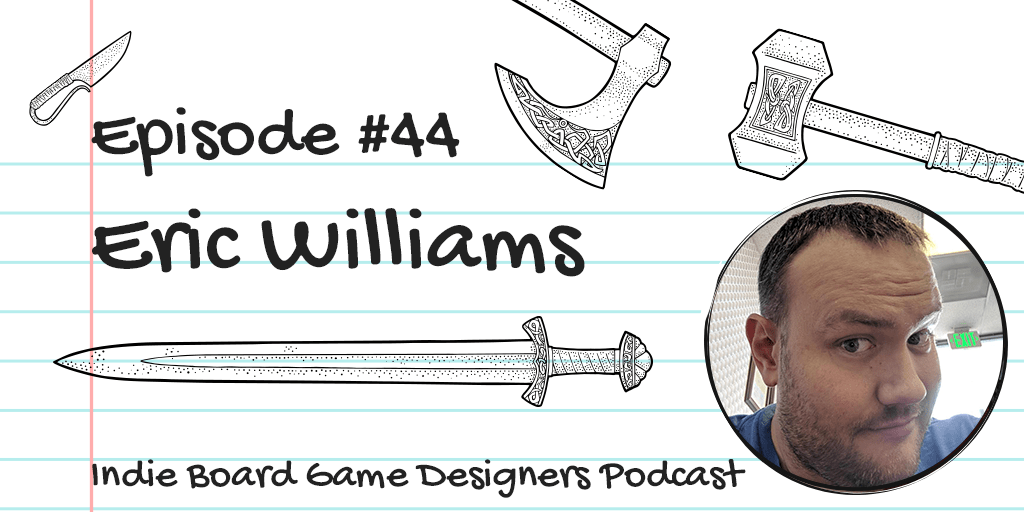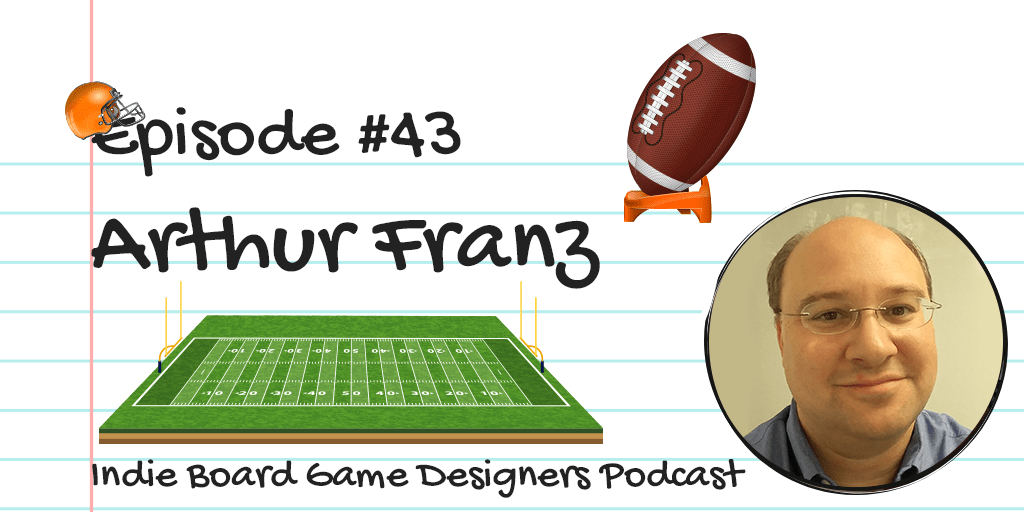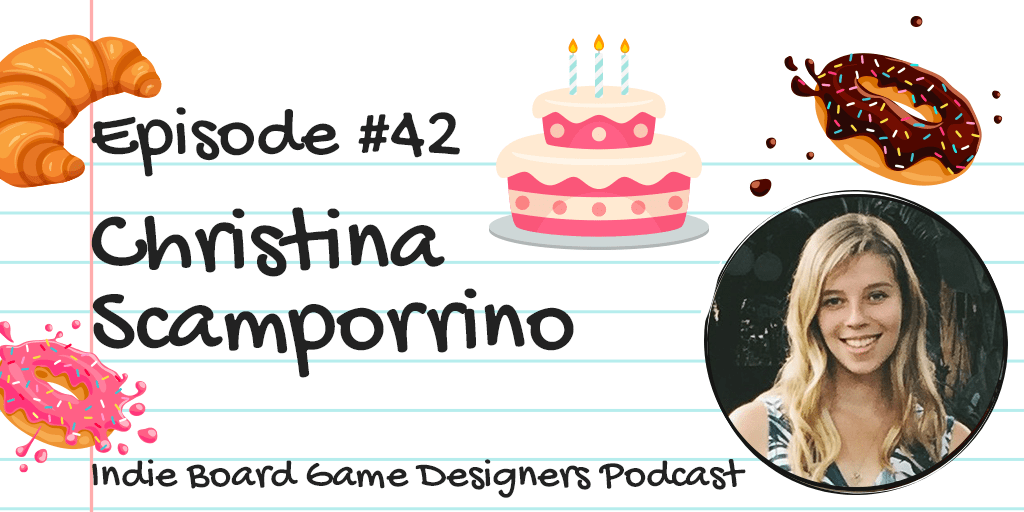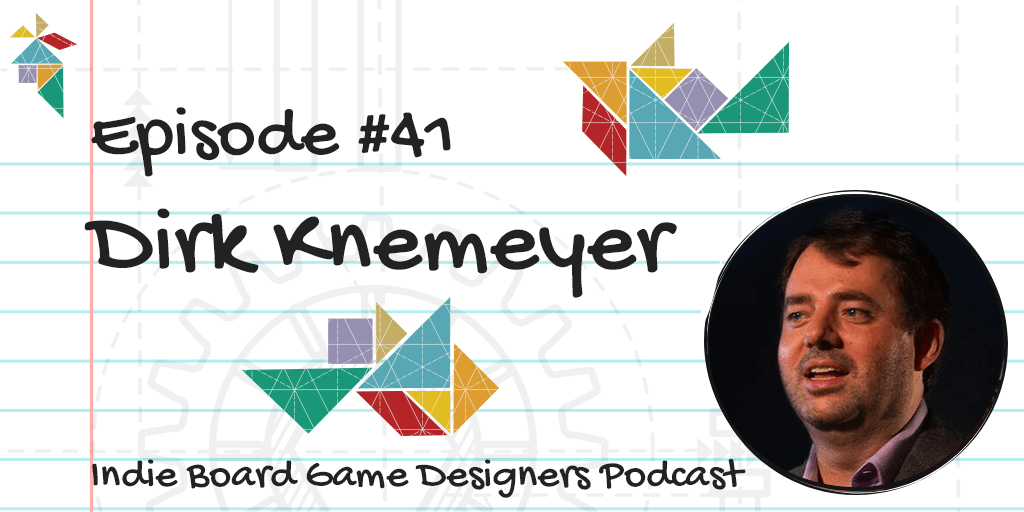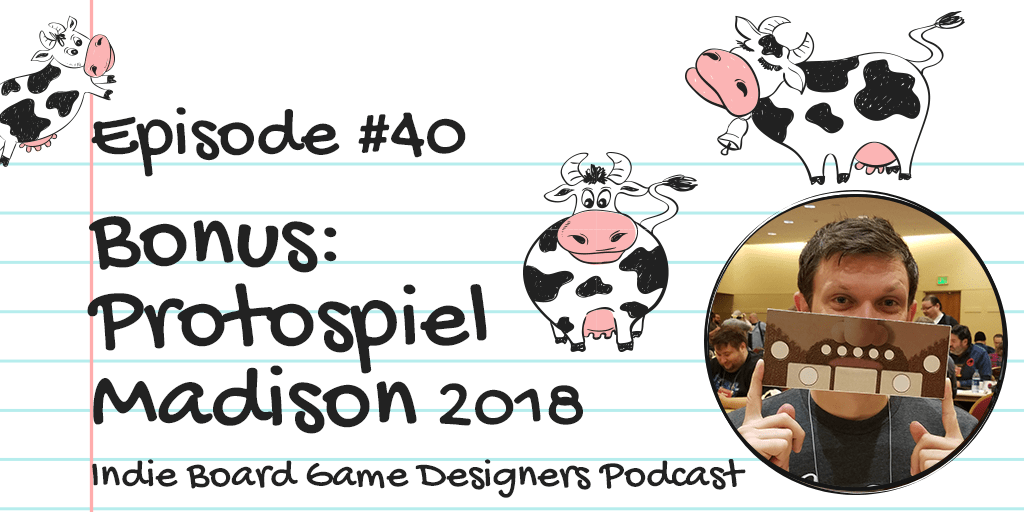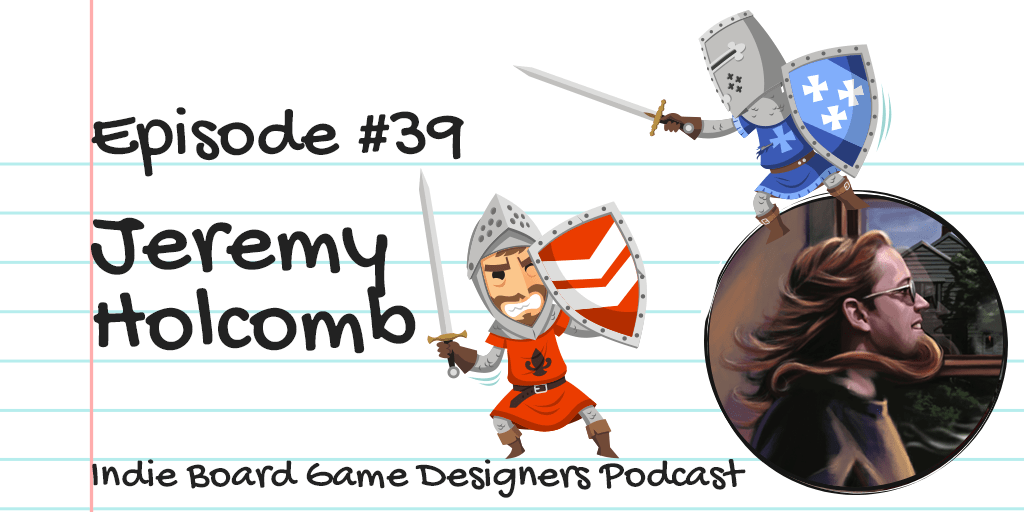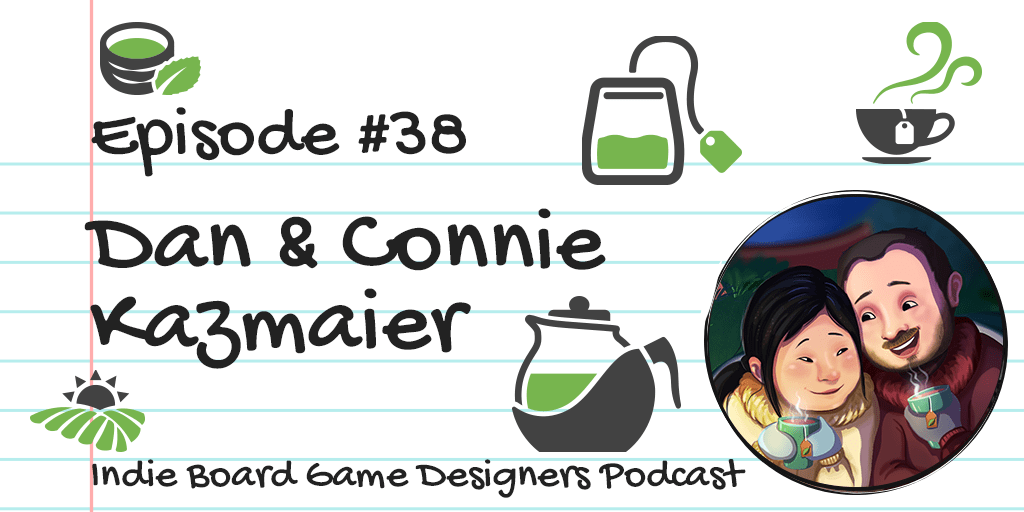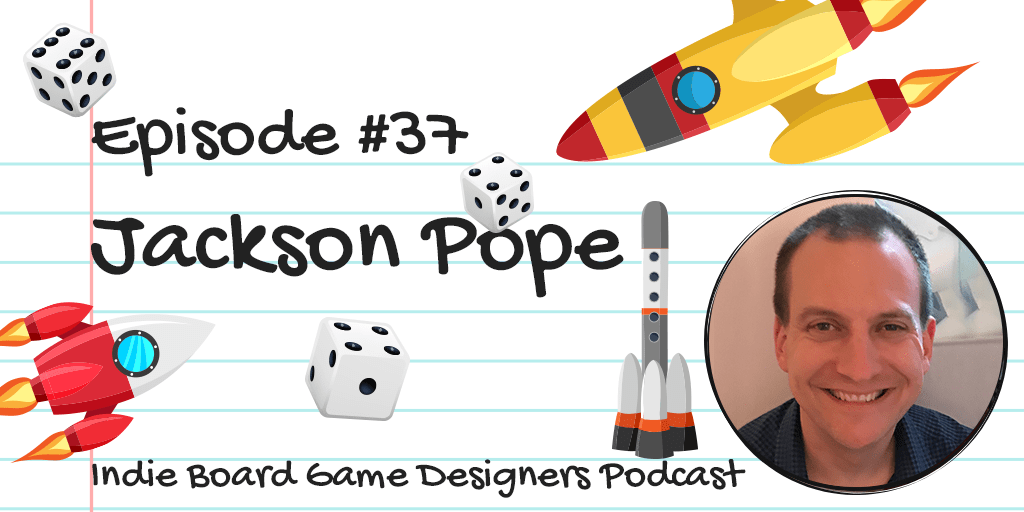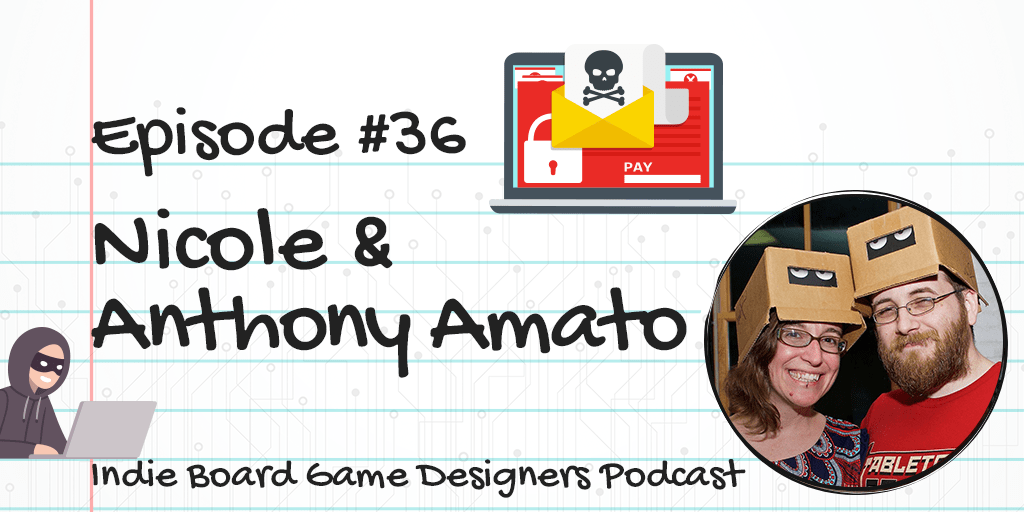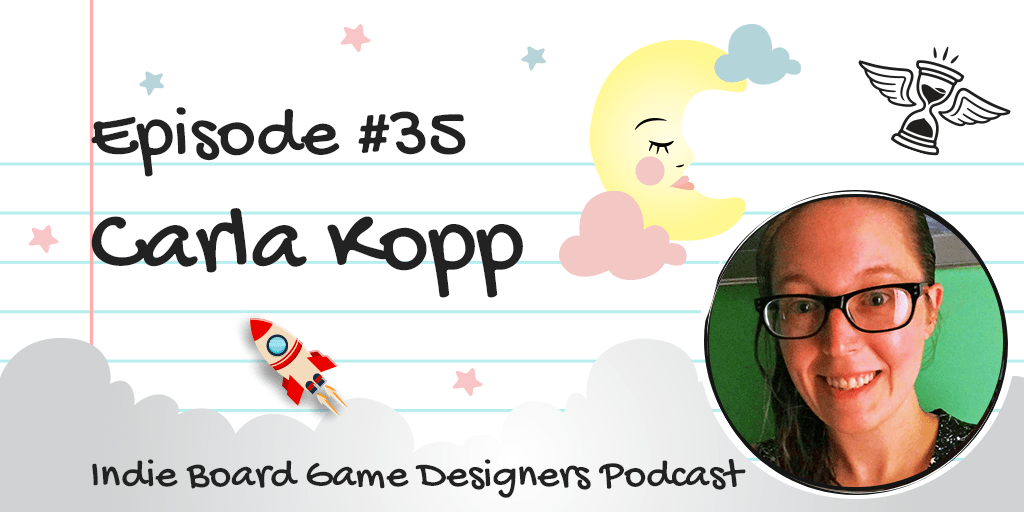Podcast: Play in new window | Download
Subscribe to podcast: Apple Podcasts |
Patrick Rauland: Hello, everyone, and welcome to the Indie Board Game Designers Podcast, where I sit down with a different independent game designer each week, to talk about their experience in game design and the lessons that they've learned along the way. My name is Patrick Rauland, and today, I'm going to be talking with Dirk Knemeyer, who runs a company called Artana, as well as he is the host for The Game Design Roundtable Podcast. Dirk, welcome to the show.
Dirk Knemeyer: Oh, thanks so much for having me, Patrick.
Patrick Rauland: So, I just want to get started with your podcast was one of the first podcasts that I found in the game design world, so it's cool to chat to you, I don't know, like a year later, to do that.
Dirk Knemeyer: Oh, great. I'm so pleased. I mean, we do the show to be of service to game designers, so that makes me really happy.
Introduction
Patrick Rauland: So, I always like to ask people a couple questions, just to give the audience an idea of who you are, so I'm going to ask you just a couple of very quick questions. If I met you at a convention, what is a game that you would play every time no matter what?
Dirk Knemeyer: Oh, gosh. You know, there's no game I'd play every time no matter what, but I love Diplomacy. Diplomacy is a game that I really enjoy.
Patrick Rauland: Nice. Who is your favorite, Tesla or Edison?
Dirk Knemeyer: You know, I'm going to defy conventional wisdom and go with Edison.
Patrick Rauland: All right, and since you do historical games, maybe like a favorite moment in history, or a favorite thing that happened.
Dirk Knemeyer: Oh gosh. Favorite, huh? I don't know, it's always what I'm learning about now, I have to say, and I've been learning about Iranian history, and Zoroastrianism, the religion, and that's really fascinating. I'm enjoying that at the moment.
How Did You Get Into Board Games & Board Game Design?
Patrick Rauland: Very, very cool. All right, so let's talk about games. First question, first real question, is how did you get into board games, and specifically, board game design?
Dirk Knemeyer: Yeah, so board games were something I was into from the time I was a little boy, you know, growing up in the '70s and '80s, so I was sort of a child of my time, you know? Dungeons & Dragons was probably the most important game for me, and of course, played all the staples, the Monopoly type of classic game that probably everyone has played. So, you know, the board gaming, and then moving into computer gaming, you know, were parts of my life really all the way through, other than maybe a 10 year period, when I discovered girls, and college, and you know, there's sort of a dark period. But otherwise, gaming has probably been my biggest hobby throughout my life.
Dirk Knemeyer: I got into game design sort of by accident. I just woke up one morning with the idea for game design, and it was a moment in my life where I wasn't fulfilled creatively. I was kind of looking for something new to do, and was really excited about the idea, and just kind of dove right in.
Patrick Rauland: So what was that idea? What was the thing that sort of brought you in?
Dirk Knemeyer: Yeah, you know, it was a game about the age of enlightenment. It was called Road to Enlightenment, and it was just the game design, basically. Again, I just kind of woke up with it and wanted to bring it to life, so yeah.
How Did You Decide to Self Publish?
Patrick Rauland: Cool. So I've been listening to your podcast for a while, and I'm pretty sure that I downloaded a bunch of old episodes, so I think I've listened to the vast majority of them, and when you started getting into this, I think you started your podcast before you had any signed or published games, and I remember there was some hesitancy, reluctance, or problems getting your game signed and published, and I could have sworn there was like an episode, where you were like, “Oh, I don't know if this is the right thing for me,” and then you started switching to your own … You started making your own games, so can you I guess tell us a little bit about that journey, which I'm sure was very long?
Dirk Knemeyer: Sure, sure. Yeah, you know, a lot of the specifics of the journey just come down to who I am as a person. I love to make things. I like to nerd out and be curious, but I'm also very introverted, very shy, and I also have a philosophical problem with sales and marketing. I'm an anticapitalist. I have different beliefs than those prevalent in our system, so the process of marketing and selling my creation is inherently odious. So, as I started on the process, and talked to a couple of publishers, you know, there was either a lack of interest, or else making me jump through a lot of hoops that were ambiguous, you know, “Oh well, make these changes to the design and then send it again. Okay, now make these changes and send it again,” with no clarity about what may or may not happen.
Dirk Knemeyer: So at some point, you know, I just said, “Look, I'm going to make this for myself.” I have been an entrepreneur previously, and I've been a creative director and designer for, I mean, at that point over a decade, so I have a lot of experience and confidence in making something sort of cradle to grave, taking it to market. So it was for how I'm oriented as an individual, but also for my experiences and sort of preparation for the process, that was definitely the right choice for me.
Patrick Rauland: Totally. That totally resonates with me. I wanted to make a board game this year. That was my challenge to myself, and one of the things I said, I think like early in the summer, was, “If a publisher picks it up, great, but I'm just going to keep moving forward,” because it just … The speed that publishers move is just a little bit too slow for what I want to do personally, right? Like, I want to put out a game this year, and I would have had to pitch it last year for that to happen, so yeah.
Dirk Knemeyer: Yeah, or earlier, yeah. Yeah.
Patrick Rauland: Or earlier. Yeah, a friend of mine … So, he and I got started in game design at the same time. We went to some of the first … There's a meetup here in Denver. We went to some of the first meetups together. He got his game signed, but I think it's coming out in like 2020, so he got his game signed way … Mine's not signed, but like, I'm probably going to release mine in 2019, so I just … I think that's funny.
Dirk Knemeyer: Yeah, yeah.
Why Focus on History?
Patrick Rauland: So Artana, you have a bunch of games that involve real history. There's Lovelace & Babbage, which just came out or is on Kickstarter. You have Einstein, which came out last year, Tesla Vs Edison, and Speakeasy Blues, which all involve periods of history, which I think is really cool. Was this a conscious decision, to move into a space where you're riffing off of real ideas in history, and there's a little bit of education there, right? Not just there was a war, we're going to reenact it, but like, you're talking about really cool turning points in history, I guess.
Dirk Knemeyer: Thanks. Yeah, I mean, that question has sort of layers for me as a designer, and then there's sort of a second layer to it, as a company. I mean, as a designer, I've always made games that relates to my interests, and I'm just not someone who's excited about zombies and dwarves. I'm someone who's excited about history, and the stories of the world, and where we've been, and where we're going, the future, as well. So, you know, I was making games that I would be interested in telling the story for, so the way I kind of say it now is whenever I read a book, at the end of the book, I generally have a game designed in my mind.
Dirk Knemeyer: And obviously, you know, to be a good game that's in the market, it needs more design work. It needs development, whatever, but I have something that is sort of a fully realized first design after reading a book.
Patrick Rauland: Wow.
Dirk Knemeyer: So, as I read a book about Tesla and Edison, which was a while ago, that even preceded my getting into game design, you know, that had me excited. Reading about Albert Einstein had me excited, so it's really just a manifestation of my personal interests. A couple of the games that you mentioned, Speakeasy Blues and Lovelace & Babbage, those are being published by my company, but they are being designed by other folks, you know, Daryl Andrews and Adrian Adamescu did Speakeasy Blues, Scott Almes did Lovelace & Babbage, so that's more of a business decision of saying, “You know, we're known for these things. Let's bring some other things in that are complementary.”
Patrick Rauland: Okay, so you put out Einstein and Tesla Vs Edison, and then Lovelace & Babbage and Speakeasy Blues came later. I guess my question is, did they approach you with a game and mechanics, and you were like, “Cool. Let's make it historical,” or did they come to you with, “Hey, we know you do some of these really neat games that involve history, and we think … You know, I had this idea about Lovelace & Babbage, which was about, you know, the first computer, and I would love for you to publish it”?
Dirk Knemeyer: Yeah, in both cases, it was the latter. It was the theme was already integrated into the game. And going back to philosophy, I mean, I philosophically believe that games should be driven by theme as opposed to mechanics, and you know, there's other people who believe differently and do different things, and some of them are brilliant, smart, and interesting people. They're not people I'd be interested in collaborating with, in terms of what my company's doing, because for me, the soul of it, it lives in the person being passionate about and loving the topic that they're covering and they're dealing with. I'm interested in working with people who are an expert in what they're talking about, and they're really wanting to tell that story, that it means a lot to them to tell the story of the dawn of computing, of Lovelace & Babbage. So yeah, in both cases, they had already figured out those things, and just in general, you know, those would be the type of folks that I'd be looking to partner with.
Opposition To Marketing
Patrick Rauland: Okay, so I want to ask you kind of about more stereotypical game themes, but you said something really interesting about having an opposition to marketing your own games. And I see that a lot in … I'm in the WordPress world, and it's a very open source, collaborative community, and people don't like marketing and selling their products. There's just like a … It's a conflict between you know you need to sell it, but you just hate overly exaggerated marketing claims. But I think there's a lot of game designers who are like that as well, who just want to … They want to make a game. They know it's good, but they just don't like this marketing part. What would you say to them?
Dirk Knemeyer: If you want your game to see the light of day, you either are going to need to do everything for yourself and publish it, or you're going to need to solve that. You're going to need to take that challenge, just like you took game design. You're going to need to take the marketing, and essentially sale of your game concept and design, just as seriously, and really invest in getting it right and putting yourself into it.
If you want your game to see the light of day, you either are going to need to do everything for yourself and publish it, or you're going to need to solve that. You're going to need to take that challenge, just like you took game design. You're going to need to take the marketing, and essentially sale of your game concept and design, just as seriously, and really invest in getting it right and putting yourself into it.
Dirk Knemeyer: And it's difficult, because few people have, both from the standpoint of skill and temperament, real strength in both the areas of product design and development and product marketing and sales, so if you're starting from the point of making this thing, it's unlikely that the sales and marketing things are comfortable for, you know, things you have experience in. But, you know, I'm not much of an alpha male guy, but I like to use the alpha male context of winning in this way. Like, if you want to win, with winning in this case meaning your game is out there, you're getting feedback on it, you've arrived, you're a designer, and your game is one that people are familiar with, if you want to win, you've got to do this. You've got to get into the sales and marketing and solve it, either from the standpoint of selling to publishers or packaging, marketing, and selling to the public. It's every bit, if not more important, than the design and development itself.
Patrick Rauland: Sorry, I have another follow-up here. Have you held yourself back in any … Because you said you were an anticapitalist. You know, everyone says, in the marketing world, “Oh, you've got to use Facebook ads,” as just one example. “You have to use Facebook ads to market,” and let's say you don't like Facebook ads. Have you ever held yourself back in one of those common sense marketing strategies that everyone says works, and you just don't believe in it, and don't want to pursue it, and you don't do it?
Dirk Knemeyer: There's not going to be one that I can remember. I mean, in the context of my gaming things, with my early games, I really didn't do much marketing. I kind of threw it out on Kickstarter, and said, “Here I am. Please love me,” and I got lucky enough that enough people loved me that I could then do the next game. Now that we have a company, I'm only peripherally involved in those things, so you know, part of it is just sort of ignorance, but yeah. I mean, there certainly are limits, you know, philosophically, where I wouldn't want to be on a certain platform or in a certain way. There's nothing that jumps right to mind, that I would pound my fist on the table and feel strongly about, but I certainly would put principle over monetization at the end of the day.
How Do You Market Non-Traditional Themes?
Patrick Rauland: Awesome. Okay, so the next question that I actually had written down was if you don't do these, you know, the zombies, and the wizards, and the dwarves, and the stereotypical themes that we … and the farming, and the stereotypical themes we see in gaming, do you think that's going to hurt your sales? Do you think people are turned off by that?
Dirk Knemeyer: Will it hurt sales? Yes, absolutely. Are people turned off by it? No, but they just aren't necessarily as interested in it. I mean, making that choice is making the choice to be almost certainly, forever, a somewhat niche creator, and I'm okay with that. I'm okay with that.
Patrick Rauland: I like that. I was just thinking, like, when I started this podcast, someone said the game … Like, if you make a podcast for game designers, like, it doesn't matter how … Like, it's always going to be a small podcast. I wonder if it's almost the same thing, where like, if you choose to make a game on this very niche topic, just, at most it's going to be as big as that niche is, and you know, you make that choice and you live with it.
Dirk Knemeyer: That's right. That's right, and you know, the things I'm doing aren't super niche. I mean, Albert Einstein is someone that a relatively broad swath of people would have some degree of interest in, but it's not the type of thing … I mean, for whatever reason that I don't understand, and I say that without casting any judgment on it, when it's zombies, people are excited. People are going to put their money down and want to see what that's about. Einstein does not necessarily generate the same degree of passion, but it's also not sort of a niche thing.
Dirk Knemeyer: I mean, in my early time of game design, I was coming more from the war game community, which are much heavier, more arcane, sort of poor user interface experiences. Those are more niche, from my perspective. I mean, most people are going to say, “Oh yeah, I like Albert Einstein.” Very few people are going to say, “Oh boy, I'm really passionate about the Korean War,” or whatever the case may be.
Do you Have a Favorite Game?
Patrick Rauland: So do you have a favorite game that you published, designed?
Dirk Knemeyer: No, it's always the one I'm working on now. For me, it's all about the creation. Once I'm done with the creation, I've moved on. You know, within six months, I can't remember rules. You know, people ask me how to play, I'm like, “I have no idea.” I'm in the future. I'm not in the past.
Patrick Rauland: That's funny. So, let me talk to you about your podcast. You're the host of The Game Design Roundtable Podcast.
Dirk Knemeyer: Yeah. One in a group of hosts, yeah.
Patrick Rauland: Yes. How did that come about?
Dirk Knemeyer: You know, I have … I mean, I'm in my 40s now. Through my adult life, when I learn, I like to share, so going back to the early days of blogging, as I was getting into design for the first time, not game design, but design in sort of a broader sense, that process was one where as I learned, I blogged, and I shared, and that worked really well, because I very quickly developed a strong network of people. It led to me getting a lot of conference talks and things, that had sort of benefit to my career, so without sort of strategically thinking about it, I just adopted that cycle, that whenever I changed into a new context, I tried to share it through whatever sort of the current appropriate media was.
Dirk Knemeyer: So it was, I was getting into game design. I was super excited about it. I wanted to learn as much as I could. For me, that process is one that involves public sharing, and at the time, you know, 2000 … I don't know what year, '11, '12, podcasting just seemed like the right media to do that, and so I wanted to do a show. A friend of mine, Bill Abner, who had a podcast of his own at the time, I mentioned to him that I was looking to do that, looking for a partner to do it with, and he joined hands with me and Jon Shafer, the designer of Civilization V, who I don't know if he was explicitly looking for the same thing, but he too was sort of searching for a platform of some kind, and it just clicked, and we ran with it.
Patrick Rauland: Did you say 2012 is when it started?
Dirk Knemeyer: Something around there, yeah. Yeah. I'm a big picture guy. I'm kind of bad on specifics, but yeah, it's been at least 5+ years, yeah.
Patrick Rauland: I did listen to your 200th episode. That's super cool.
Dirk Knemeyer: Thanks, yeah. It's a little surreal. You're like, “Wow, you know, a lot of years have passed, and a lot of stuff is here now.” It's neat.
How Has Your Process Changed?
Patrick Rauland: So, how did publishing your first game change your process?
Dirk Knemeyer: Oh, dramatically. I mean, when I did my first game, I didn't know … I mean, I truly did not know what I was doing. It was a process of total ignorance, and now as someone who has a lot of experience in the industry, the way I would characterize it is the game was almost completely designed, but wasn't in any way developed. So, you know, it was, let's say less than half of … I don't know want to say effort, because I put a lot of effort into it, but I'd say less than half of sort of the diligence that needs to go into a complete and properly developed game had gone into it. I learned, you know, as a result of the failings of that game, part of where I had fallen short. My next game was much farther along, but still wasn't developed enough. My next game still wasn't developed enough, but each time, I was getting closer and closer.
Dirk Knemeyer: And since then, now the games are fully developed. Some of them, I did myself. Others, I've had collaborators on the development side, working with me, and I mean, one thing that I've surely learned, not just what is sort of the correct process to get to a complete game, but also what should my role be, and the role of the artisan, soup-to-nuts, cradle-to-grave game designer is probably not the right function for me. You know, I should be in the context where I'm either working with a co-designer, or I'm working with a developer who is really engaged and carrying a lot of water, because if I'm going to fall short, it's going to be on that endurance, that diligence of just grinding through test, iterate, test, iterate, test, iterate. I'm not going to give that the due that it needs, to have the game I want to have at the end of the day. And it just took time to learn that, and trying different things, and yeah, just becoming more conversive in game design [crosstalk 00:20:08].
How Do You Know What Part of Game Design you Like?
Patrick Rauland: Yeah. So, if you don't know what you are, let's say you're an aspiring game designer, and maybe you have a couple ideas in your head, and maybe you've play tested a couple of times, like, how do you know maybe what you're good at? Because then you can try to find another designer friend to help you out with a part you're not good at. Is there a thing you can do, a thing you can test, or do you just have to do everything and then feel it out?
Dirk Knemeyer: I mean, I think the most sure way is to go through the process and learn, but you know, I mean, you certainly too can look at yourself in other contexts and transfer that. I mean, for example, as a writer, I have fantastic concepts. Like, my first draft of writing is really strong, but I don't tend to … Don't tend to is even wrong. I resist or refuse to do edits. When I do drag myself through edits, the grammar is not going to be right, so I could tell, from my much longer experience as a writer, that upfront stuff, big picture stuff, sort of complex system stuff, I'm great at. Detail stuff, things that to me are more grindy, are a problem, and game design has mapped similarly. So, I do think there's a likelihood that if you look at yourself in other contexts, and map that onto a total game design and development process, that there will be overlap, that how you are in one context will be similar in this one, but I can't guarantee that, and I don't want to steer you wrong.
What Research Do You Do for a Game Design?
Patrick Rauland: Yeah, yeah. Love it. So you talked earlier about, you know, you read a book, you get a game design idea. Do you do any extra research? Do you ever seek out specific books for that purpose? Like, what research do you do and how long do you spend researching before you maybe start that new game design?
Dirk Knemeyer: I do a lot of research. The game design is happening in my mind from the earliest moments of the research, so there's not a staging, where I'm off doing research for a long time, and then I start doing design. Like, as I'm diving into a topic, I'm starting to create a mental model of what are the important things that need to be part of the story? How can those things manifest? So yeah, I mean, the design and research, for me, are really intertwined. There is the initial book, like I mentioned, but yeah, there's a lot of extra research after as well. The different games are different amounts of research, more recently in part because it's where the market is going. I've been doing lighter games. My earlier games, for the most part, were much heavier, and the lighter games need less research.
Patrick Rauland: Sure.
Dirk Knemeyer: Which is a bad thing, because I love the research, but it's a good thing, because it takes a lot less time, to not have to do as much. But yeah, I mean, Road to Enlightenment, I had hundreds, if not thousands of hours of research into it, whereas Einstein would be certainly dozens, but certainly short of hundreds of hours. So that's almost an order of magnitude less research work from my heaviest to my lightest game.
Patrick Rauland: One of the things I'm a big fan of is sort of like setting yourself up, so that you … Like, building habits, so that you don't have to try to do a thing. Going back to reading books, do you specifically read history books now, or something similar to those, so that you get game design, or do you read history books just completely separate, just because you love those books, and the game design is purely an added benefit?
Dirk Knemeyer: Yeah, the game design is an added benefit. I'm reading things that interest me. I mean, one of the things that I love about myself is I'm interested in almost anything. Like, if somebody came to me and said, “Dirk, I've got this book on knitting. It's great, you know? You've got to read this book,” I'm going to read it, and if it's a good book, I'm going to get excited about knitting. I'm going to want to make a game about knitting. So in that way, I'm very pliable, because for me, it's just about getting excited about a topic and then telling a story about it, and ultimately, even though I will tend to pick history a lot of times, when I'm reading, it could really be pretty much any topic, and I can get excited about it.
Does Game Design Energize or Exhaust You?
Patrick Rauland: Love it. So, just game design in general, does that energize or exhaust you?
Dirk Knemeyer: It depends. The early stages are energizing. The later stages are exhausting.
Patrick Rauland: Do you-
Dirk Knemeyer: And it's very binary. I mean, I love game design when I'm getting all the way through to the first playable prototype, and then even some N number of revisions from first playable to more refined, more refined, more refined. At some point in those revisions, it flips from being energizing and exciting to, “Oh my god, get me out of here.” And that's the point at which I really should change my role in the process.
How Many Unpublished Games Do You Have?
Patrick Rauland: And then, so, how many games do you have that are unpublished, half finished, or somewhere stuck in the pipeline?
Dirk Knemeyer: It's a lot. It's double digit, for sure. You know, I'd say there are at least half a dozen that are truly half finished, which is to say well through a design process. You know, if they were released as they were, people would say, “Oh, it's not finished, but it's pretty good” kind of thing. And then, I mean, it's dozens that are in some stage of research and early design.
What Does Success Look Like To You?
Patrick Rauland: So, my favorite question that I tend to like to end the show with is, I mean, what does success look like to you? And maybe since it seems like, I think, some game designers would say you're running your own publishing company, you're already successful. Maybe what did it look like and what does it look like now?
Dirk Knemeyer: So let me be clear. I am not enjoying financial success from this.
Patrick Rauland: Okay, yeah.
Dirk Knemeyer: Yeah, so I am running my own publishing company, but, I mean, we're just sort of breaking even. I mean, we're just sort of scrabbling along. When the company started, I put money into it to get it started. I've never gotten that money out, but I also haven't put more money in for a long time, so that's a success in and of itself, but it's not … You know, I can't quit my day job so to speak. You know, I need alternate sources of income, because I have a family and other commitments.
Dirk Knemeyer: So at this point, having done it for a while, I've become convinced that it's really hard to make a living as a small indie publisher. I think you have to get incredibly lucky, and I'm still open to that happening with Artana and my game design stuff, but I no longer am expecting it, you know? I'm focused on having other parts of my life that are providing the income to live and make the commitments that I have fulfilled, so success, that would be a form of success, if I could start making enough money that I could stop doing some other things, but definitely not looking for that.
I've become convinced that it's really hard to make a living as a small indie publisher. I think you have to get incredibly lucky
Dirk Knemeyer: I mean, right now, you know, success for me … The greatest joys that I've gotten from game design are when at a convention and somebody who's a specialist in the area that I've made a game on comes to me and is excited, and just shares their excitement that I've brought it to life. I've probably had the most of that with my second game, which was called The New Science. It's a game about the scientific revolution, and it's in the dozens now, where people have come up to me and said, “I'm a research scientist. Oh my god, you nailed it. It is so cool. We love playing this game. It's exactly what it should be,” and that, for me, is success, because at the core of it, that's what I was trying to do. I was saying, “Here's the story of the scientific revolution and research science. How can I bring that to life?” And when the thematic experts tell me I've done that, that feels great.
Dirk Knemeyer: And you know, from a commercial perspective, that's not necessarily good, because the nerding out of a research scientist often has little overlap with the excitement of a hobby board gamer who's not interested in research science, but in terms of my personal motivations, and where I'm fulfilled and getting feedback that makes me feel like this was really worth it, I'm feeling good about myself, that would be it.
Patrick Rauland: I love that answer. And as I'm talking to you, I'm kind of picking up that you like learning new things, repackaging them into like a new container, a new context, a new format, delivering that to other people, and then hoping they get something out of it. Like, it seems like you really like that almost transference of knowledge. You know what I mean? It's like you read the entire encyclopedia, and then you tell someone the coolest, top five things you read out of it, or something like that. But I just want to go back-
Dirk Knemeyer: [crosstalk 00:29:26] think of it. You know, there's other storytellers, who when it comes to a subject like an Einstein, or a Tesla Vs Edison, they're going to write a book, or they're going to make a movie, and the medium that I've chosen instead is games.
Patrick Rauland: That was exactly what I was trying to say.
Dirk Knemeyer: Sorry, I didn't mean to-
Patrick Rauland: Yeah, yeah. No. No, no, no, as in I was not very eloquent, and you were able to put it in better words than I was. Can I go back to not being financially … I don't want to use the word solvent, but you know, not making money with your business.
Dirk Knemeyer: Sure.
Patrick Rauland: That is so, so common, from everyone I talk to. Almost everyone I talk to is not … If they are making money, it's like part time, and they have to have a full-time job on the side, or something like that.
Dirk Knemeyer: Yeah.
Patrick Rauland: God, I don't even know what the question is here, other than like is that just the industry? Is that just the industry of board games? For an amateur designer like myself, how does Fantasy Flight Games make money and employ dozens, I don't know how many employees, but let's just say dozens, maybe hundreds of employees, while all these small little companies can't make a run of it? How does that work?
Dirk Knemeyer: Well, it's like any business. I mean, there's two parts. There's the any business part, and then there's the game design industry part. For the any business part, one in five businesses survive past the first two years after they've been incorporated, right? And then of that, only 20% that even survive, how many of them become Google, or Apple, or Amazon, which are … let's say are roughly equivalent to Fantasy Flight, in the context [inaudible 00:31:02] It's a microscopic number, right? So, you know, yes, there can be a microscopic number of the game publishing companies that have ever been made, that are huge, huge corporations, that relative to our industry are making money hand over fist. But, the reality of business is just most companies fail, and/or most companies just kind of drag along for a while.
Dirk Knemeyer: And in game design, you know, it's really an economics 101 thing. You have an industry where all kinds of people, endless, limitless people, virtually, will give away labor for free. I can get free anything I want. I can get free design. I can get free development. I can get free art. I can get whatever I want for free, if I really want to, and as a company, I mean, for the most part, it's paid relationships that we have, but if we're in an industry where there's tsunamis of free labor at every part of the human capital spectrum, there's going to be more product that's being able to put out more cheaply, and can be priced more aggressively. So it just becomes a race to the bottom, and it becomes a really difficult environment to make money in.
Patrick Rauland: You know what? One of the things I was just thinking about as you were talking about this is maybe there's a bit of a survivorship bias. That's not the right word, but you know, if I'm listening to a podcast about accounting, and someone can't make their accounting business work, they quit the business and they get a full-time job in some other industry. In game design, people, like if you can't make money, but you love games, you still might keep doing that.
Patrick Rauland: So I talk to, I think, a lot more people who have … Maybe they tried to make it full time and they couldn't or they just never … You know, they've just been doing it part time the whole time or whatever, but they're still in the industry, whereas if it's a … Yeah, you're an accountant, you're a lawyer, you're an attorney, whatever … Oh, that's the same thing, you know, you just drop out and you change industries or get a full-time job somewhere else. So I wonder if there's just … It seems like there's more people who haven't made their dream work. You know what I mean?
Dirk Knemeyer: Sure, sure, and you know, also, I mean using those examples, even if someone professionally enjoys being an attorney or an accountant, there's few to none of them, in any universe whatsoever, who in their free time would choose to be chunking away on law work and on accounting work, unless it's for some game company that they're excited about, or some nonprofit that they're passionate about. Like, the tasks inherent in that are not the way they want to spend their time, whereas as game creators, that is how we want to spend our time when we have control over it as well, which sadly only further waters down and jeopardizes the marketplace.
Overrated/Underrated Game
Patrick Rauland: Well, awesome. Well, thank you for going very deep on this. I like to end my show with a little game. It's called Overrated Underrated. Have you heard of it?
Dirk Knemeyer: Not in this context, so let's-
Patrick Rauland: Excellent. So I'm just going to say a word or phrase, and then you have to pick if you think it is overrated or underrated. So I might say the weather in Denver, and you're going to be like underrated, because it's sunny and wonderful, something like that. Got it?
Dirk Knemeyer: Got it.
Patrick Rauland: All right, cool. Number one, Kickstarter. Is it overrated or underrated?
Dirk Knemeyer: Underrated.
Patrick Rauland: Underrated? Why's that?
Dirk Knemeyer: Kickstarter has transformed game publishing. It's had a seismic impact in the way that it has democratized the ability to make and publish something, and I just think it's underappreciated. I think, yeah, we all know it's a big deal, and we all, or many of us, will spend a lot of money on it, but the impact that it's had, sort of from a sociological perspective, on our community, I just don't think it can be overstated.
Patrick Rauland: Love it. What about teaching history classes in high school? Overrated or underrated?
Dirk Knemeyer: I guess I'll say underrated, because I think history is just fantastic, and relative to other topics, it should get more love.
Patrick Rauland: How about tile laying games? Overrated or underrated?
Dirk Knemeyer: I don't know how they're rated. As someone who doesn't particularly care about tile laying games, I'll say overrated.
Patrick Rauland: There we go. All right, last one here. Twitter, is it overrated or underrated?
Dirk Knemeyer: I'm going to go underrated.
Patrick Rauland: Ooh. Tell me why.
Dirk Knemeyer: It is magical that we can now write directly to 99.9% of the celebrities and famous people of the world from our desk in real time. Like, that's insane. Like, before Twitter, we wouldn't even have a vehicle to get something within the view of those people. It was impossible. And now Twitter not only makes it possible, but it facilitates that happening. So, even if Twitter ends up shutting down, and at some point, it will inevitably, that function of connecting each individual to one another in a direct way, that doesn't require leaving your chair, or your bed, or your toilet, is amazing.
Patrick Rauland: Awesome. Dirk, thank you so much for being on the show.
Dirk Knemeyer: My pleasure.
Wrap Up
Patrick Rauland: Where can people find you online?
Dirk Knemeyer: People can follow me on Twitter @DKnemeyer. That's @D-K-N-E-M-E-Y-E-R. I'm also happy to converse on email, and for that, you would email to Dirk@artana.com. That's A-R-T-A-N-A .com, and Artana is my game company, at artana.com.
Patrick Rauland: So, since you just had that answer on Twitter, I think they should definitely just start sending you messages directly that way, right? That's like the best way?
Dirk Knemeyer: They're welcome to. I'm here and available, and I've responded to every email or note that I've ever been sent. I will engage people who engage me.
Patrick Rauland: I will say, I just randomly emailed you out of the blue and said, “Yo, do you want to be on my podcast?” and you were like, “Yep,” so yes, you do. One out of one in my history, or experience. You've answered all my emails. So, thank you again. Listeners, if you enjoyed this podcast, please leave us a review on iTunes, or wherever you're listening to this. If you leave a review, Dirk said he'd make a mini-game involving your family history, or does that sound reasonable? Some ridiculous thing like that?
Dirk Knemeyer: I'll take it on a case-by-case basis.
Patrick Rauland: Case-by-case … All right, fair. So you can visit the site at indieboardgamedesigners.com. You can follow me on Twitter. I'm @BFTrick. That's B as in board games, F as in fun, and Trick as in trick-taking games. That's all we got, so until next time, happy designing. Bye bye.

